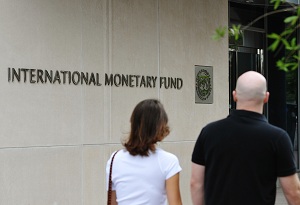
(AFP Photo)
The International Monetary Fund (IMF) said no new mission is scheduled to visit Egypt at the current time, with the country working on meeting conditions to secure a pivotal $4.8bn loan needed to bolster the economy. Meanwhile, presidential adviser Essam Al-Haddad has blamed the US-based lender for delaying talks.
Following media reports that a delegation from the fund is planning on visiting Egypt soon, IMF spokesperson Olga Stankova said in a statement that the IMF’s staff is working with Egyptian authorities from their headquarters and are making good progress on the technical front. “We look forward to the resolution of the remaining technical issues and preparatory work by the authorities, which would enable us to field the mission to conclude the negotiations,’’ she said.
Al-Haddad told the Financial Times earlier this week that the Egyptian government has taken all the necessary steps to meet the conditions set by the IMF, and that the lender is responsible for the delay.
The government has already implemented a plan to curb subsidies on energy and bread, and introduced sales tax law on a number of goods and services since December, he said.
He added that Egypt’s budget deficit is expected to decrease to 9% by June 2014 as was requested by the international lender.
However, the IMF has recently published in a report, Regional Economic Outlook, that Egypt’s economy is expected to grow at a slower rate during the next fiscal year compared to 2012-2013.
The report predicted Egypt’s GDP growth will decrease to 2% in the coming fiscal year, compared to 2.2% last year, while also predicting inflation rates will increase to 10.8% by the end of this year.
Al-Haddad added that the global lender is holding up talks to finalise the agreement, as it had not yet received consensus from political parties on the government’s economic reform programme.
Despite that, the IMF stated last Thursday that they are “making good progress” in their discussions with the Egyptian authorities over the loan package.
Egypt has been negotiating with the IMF for two years now over the proposed $4.8bn loan to support the country’s ailing economy.
Tunisia, which preceded Egypt in the Arab Spring upheaval, succeeded in securing a $1.74bn loan from the IMF on Friday to salvage the country’s economic strains.
